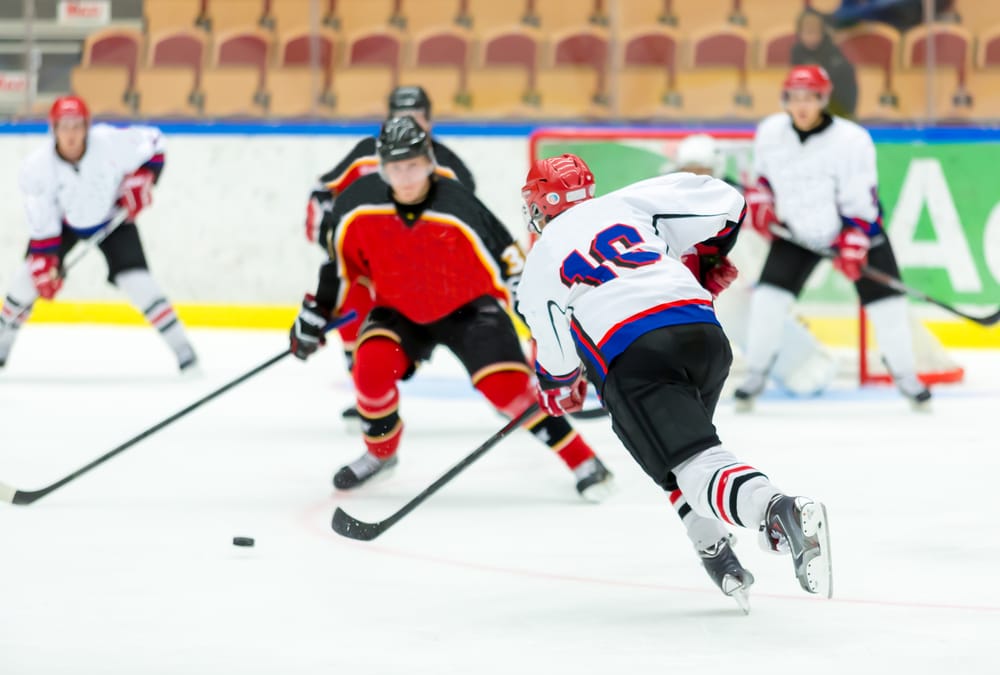Max grew up in Chicago and played hockey from a young age. At age 14, he moved to Maine to play prep school hockey, landing a scholarship to play Division III hockey at Plymouth State in New Hampshire. At just 18 years old, Max was the youngest student on the team by three years. With an intense focus on his sport, he didn’t have much interest in drugs or alcohol. But that changed his freshman year in college. During his first hockey game, Max tore his hips and shoulder. After three hip surgeries and a shoulder surgery, Max’s doctor told him he couldn’t play hockey anymore. His doctor prescribed him Vicodin and Max “went down fast.” He knew he shouldn’t go down that road. Opiate addiction ran in his family. But it was too late.
A Rapid Decline
“After losing my favorite thing in my whole life, I totally lost myself,” Max says. Vicodin turned to Xanax and smoking marijuana and using Molly to get higher. “After two or three months, I’d need something else to be able to feel high again.” He justified the drug abuse by telling himself, “I’m in pain. I deserve this after everything I’ve been through.” “At first it was fun,” Max recalls. “But then it became maintenance–trying to avoid withdrawal. On a hard day or the best day, I justified picking up a drug.” He became filled with rage, and his family didn’t want to talk to him anymore. He had money and was doing well in school, but he describes it as the saddest time in his life. “I looked in the mirror and didn’t know who I was anymore,” he says. “I couldn’t believe this is what my life had become.” At his lowest point, Max had run out of drugs and all of his dealers were out of town. He was having brutal withdrawals and felt desperate. Max called his mom and admitted he had a problem. To his surprise, she responded “Finally!” His family had suspected he had an addiction for years, but didn’t want to confront him before he was ready to get help. “I thought I could do it on my own, but I couldn’t,” Max says. “It was the first time I ever asked for help.”
Going ‘All In’ With Recovery
Max spent 30 days in residential treatment at Promises, followed by 60 days in sober living. He used many of the skills he had learned in hockey and applied them to drug rehab. “I’ve always been very coachable,” he says. “I watched others and surrounded myself with the best so I could become the best.” When it came to addiction recovery, Max went “all in.” He listened to his treatment team, including a technician who he says “spit wisdom” at him. “They never gave up on me,” Max says. “I came in going crazy and they’d tell me I was normal and human and that it was okay to have bad days.” He got a sponsor five days into the program, worked the 12 Steps, and built a community that included Promises alumni and staff, AA and his sponsor. He is still in touch with the “lifetime friends” he made in drug rehab. “Promises taught me the fundamentals of how to live life sober,” he says. He started meditating two days per week–a practice he strongly recommends, particularly for people with anxiety, ADHD or depression and those trying to kick a prescription pill addiction–and discovered acupuncture could help him manage the pain from his surgeries. “To this day, my parents say it’s the best money they ever spent on me,” he says. Since he was young when he got sober, an important part of addiction recovery was learning to have fun without drugs or alcohol. “It’s hard when you’re young, but the answer is fellowship–building a community of people your age and doing things with them,” Max says. “Today I have fun. I laugh–I never used to laugh.”
A Fresh Start
After maintaining his sobriety for a year, Max moved to Denver, finished his college degree in business administration and got a job as a real estate broker. “Starting a new career in a new city has been a challenge. I’ve had to recreate everything I did in L.A.,” he says. “But getting comfortable in an uncomfortable setting has been a good test.” At 23 years old, “I’m a functional member of society. I have a job I never thought I could get and I truly love what I do,” Max says. The oldest of five children, Max is proud that he “finally acts like an older brother” and has grown closer with his siblings. He is discovering new passions like skiing and is working on fitting old passions back into his life by coaching hockey. Still, there are days when “just for today” ends up meaning “just for the next 30 minutes” or even “just for the next 30 seconds” but he has the skills to stop thoughts and feelings from leading to relapse. “I was playing hockey at the highest levels of training and competition, and recovery is 10 times harder than any game,” he notes. But he is grateful to have found his way in his 20s, with most of his life still ahead of him. “There’s a saying in AA that ‘you’ll live your wildest dreams sober.’ It’s not a cliché,” Max says. “I can support myself, I show up and I have a life I love.”

